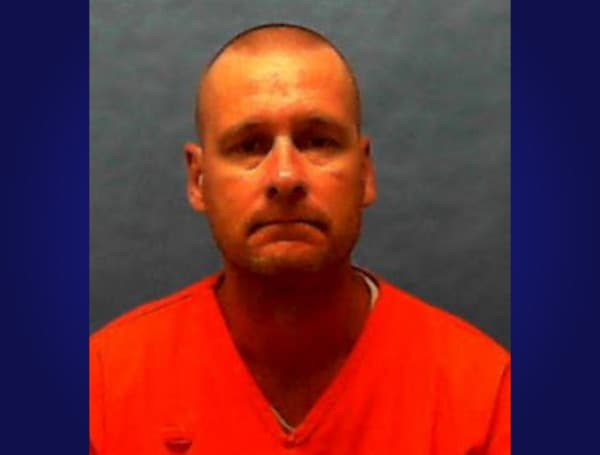
Attorneys for convicted killer Michael Duane Zack on Tuesday asked the U.S. Supreme Court to block his planned Oct. 3 execution, after Florida courts rejected arguments that he should be spared because of Fetal Alcohol Syndrome.
The attorneys filed a request for a stay of execution and an accompanying petition asking the U.S. Supreme Court to consider the issues in the case. The move came after the Florida Supreme Court on Thursday refused to halt Zack’s execution for the 1996 murder of a woman in Escambia County.
Meanwhile Tuesday, a panel of the 11th U.S. Circuit Court of Appeals rejected a separate request for a stay of execution that was based on arguments Zack received a flawed state clemency process.
In the news: Hillsborough County Sheriff Warns Jury Duty Scams On The Rise
Zack’s attorneys contend he should be shielded from execution because of Fetal Alcohol Syndrome that he suffered because his mother drank alcohol while pregnant. The U.S. Supreme Court ruled in a 2002 case known as Atkins v. Virginia that executing people with intellectual disabilities violates the Eighth Amendment ban on cruel and unusual punishment.
Tuesday’s request at the U.S. Supreme Court for a stay of execution said “the medical community now recognizes that the unique, cognitive, practical and social impairments inherent to Fetal Alcohol Syndrome (are) indistinguishable from those of Intellectual Developmental Disability.”
“At every opportunity since his trial, Mr. Zack has presented evidence of his prenatal alcohol exposure to the full extent allowed by then-contemporaneous scientific legal and legal standards,” the request said. “Evolving standards of decency have finally progressed to the tipping point that allows Mr. Zack to establish that his FAS (Fetal Alcohol Syndrome) disability affords him the same protections established in Atkins. To deny review would penalize Mr. Zack for being right too soon.”
But in its ruling Thursday, the Florida Supreme Court said Zack has raised intellectual-disability arguments over two decades of appeals. As a result, the court said the latest arguments did not meet legal tests for “timeliness” and were procedurally barred.
In the news :Florida Death Row Inmate Michael Duane Zack To Be 6th Inmate Executed In 2023
The opinion, written by Justice Renatha Francis, said Zack’s claim that he should be shielded from execution “is, at its core, the same claim he’s repeatedly raised since 2002.” The Supreme Court upheld an Escambia County judge’s ruling.
“As demonstrated by the extensive history of Zack’s postconviction and habeas proceedings, the facts upon which his intellectual disability claim is predicated have long been known to him and his attorneys,” Francis wrote in Thursday’s 34-page opinion. “He has long known his IQ score range (the lowest score of 79 was established in 2002) and his experts’ FAS diagnosis (relied on at trial in 1997). Yet, he relies on this 20-year-old-plus information to now claim he should be deemed intellectually disabled and, thus, categorically exempt from execution. … But Zack raises no newly discovered evidence on this point.”
Gov. Ron DeSantis on Aug. 17 signed a death warrant for Zack, 54, in the murder of Ravonne Smith, who was killed in her Escambia County home after meeting Zack in a bar where she worked. A jury in September 1997 convicted Zack of first-degree murder, robbery with a firearm and sexual battery, records show. He also is serving a life sentence for the murder of Laura Rosillo in Okaloosa County shortly before the Smith killing.
Zack’s attorneys filed cases in state and federal courts to try to prevent the execution. The federal-court case has centered on the state clemency process but also involves issues related to Fetal Alcohol Syndrome.
Zack’s attorneys have argued, in part, that his clemency interview was in 2014 and that he has not been able to provide medical evidence that has emerged since then about Fetal Alcohol Syndrome. Clemency was denied in August when DeSantis signed the death warrant.
In the news: FTC, 17 States Sue Amazon Claiming An Illegal Monopoly
But U.S. District Judge Robert Hinkle refused to issue a stay, and the panel of the Atlanta-based appeals court followed suit Tuesday. Among other things, the appeals court said “there is no provision in the clemency rules that prevented Zack from providing supplemental materials (about Fetal Alcohol Syndrome) if he believed they would bolster his clemency application.”
“While Zack is correct that there is no clemency rule affirmatively authorizing supplemental submissions, there is also no rule precluding them,” said the appeals-court ruling by Chief Judge William Pryor and Judges Robin Rosenbaum and Jill Pryor. “And the state says that any materials that Zack submitted about the research on FAS would have been considered as part of his clemency application. So based on the record, we cannot conclude that there was no opportunity for Zack’s counsel to submit updated materials.”
Android Users, Click To Download The Free Press App And Never Miss A Story. Follow Us On Facebook and Twitter. Signup for our free newsletter.
We can’t do this without your help; visit our GiveSendGo page and donate any dollar amount; every penny helps
